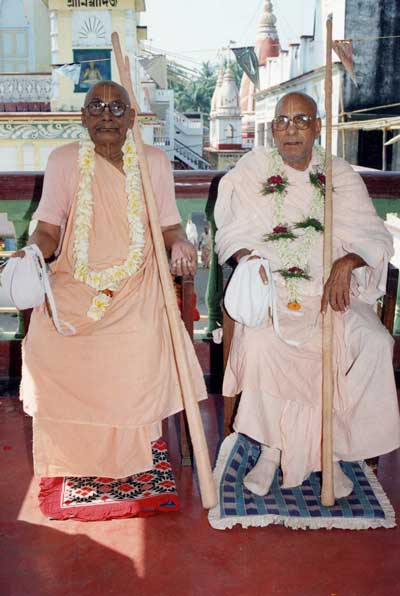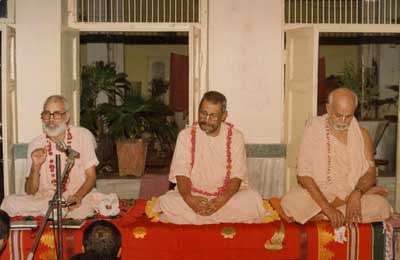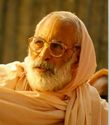

Govardhana, India: November 13, 2007 PM
During the auspicious month of Kartika, Srila Bhaktivedanta Narayana Gosvami Maharaja and the assembled international parikrama pilgrims celebrated the disappearance day of Srila Bhaktivedanta Vamana Gosvami Maharaja and Srila Bhaktivedanta Trivikrama Gosvami Maharaja. Srila Trivikrama Maharaja left the vision of this world in 2002, and Srila Vamana Maharaja left on the same day, two years later.

As he does every year at this time, Srila Narayana Gosvami Maharaja organized a Separation Festival (Viraha Mahotsava) for them, at which time he called on several of their disciples to speak about their glories and offer heart-felt sentiments. Almost everyone spoke in Hindi, as did Srila Narayana Maharaja himself.
The following is a simultaneous translation of Srila Narayana Maharaja’s glorification, given by Akhilesh dasa Adhikari, who spoke into a transmitter. Most of the 700 or so Westerners from various countries present were able to hear the translations in their headphones, because there were also simultaneous translations from English to Russian, Chinese, and so on.
For a great soul there is no difference between his appearance and disappearance days* because he is actually always present to guide and give his blessings. These days are especially powerful occasions to remember them and receive abundant blessings. Therefore, please accept the transcription of the lecture below, given this Kartika, on Srila Vamana Maharja’s disappearance day:
Today we will discuss the glorious characters of Parama-pujyapada Srila Bhaktivedanta Vamana Gosvami Maharaja and Parama-pujyapada Srila Bhaktivedanta Trivikrama Gosvami Maharaja, and the devotees will offer puspanjali (their flower-like hearts’ offering of glorification) at their lotus feet.
According to the degree of love and affection towards someone, one will experience that much separation for a person. The gopis had so much affection for Sri Krsna, and that is why they felt so much separation when He went to Mathura. We have read about the various stages of their separation in the Srimad-Bhagavatam and other scriptures.
Similarly, the more one is attached to Srila Gurudeva’s lotus feet, the more separation one will feel in his absence. We see the topmost example of this in the life of Srila Ragunatha dasa Gosvami, who had so much affection in his heart towards his siksa-gurus, Srila Rupa Gosvami and Srila Sanatana Gosvami. What was the condition of Srila Raghunatha das Gosvami when their pastimes became un-manifest in this world? He saw Giriraja Govardhana like a python, all of Vraja seemed empty to him, and appeared like the mouth of a very ferocious tiger. Due to his love and affection, this is how he described his separation from Srila Rupa and Sanatana Gosvamis.
According to how much affection you have towards your Gurudeva’s lotus feet, that much separation you will feel. You must understand that the devotee who feels separation from his Guru is very elevated in bhakti, and he will soon attain the lotus feet of Sri Sri Radha and Krsna. Without Gurudeva’s mercy, this is not possible.
I spent more than sixty years with Pujyapada Srila Bhaktivedanta Vamana Gosvami Maharaja and Pujyapada Srila Bhaktivedanta Trivikrama Maharaja. We had a very special relationship, and we were related in so many different ways. I had a first-hand opportunity to observe their guru-seva. I directly saw how Srila Vamana Maharaja was ready to give his life for his Gurudeva, and I understood how my Gurudeva used to feel indebted to Srila Vamana Maharaja for his service. When Srila Vamana Maharaja’s hand was caught in the printing press, Srila Guru Maharaja wept, and he traveled with Srila Vamana Maharaja to the hospital in Kolkata. When you see Sri Guru crying for his disciple, you can understand that his affection towards that disciple is very deep.
I have seen that if there was work which involved a lot of responsibility, my Gurudeva would not give that work to me or Srila Vamana Maharaja, but to Srila Trivikrama Maharaja, and he would not take it easily. He would argue and ask questions, and then he would accept that work and complete it.
Srila Gurudeva always saw Srila Vamana Maharaja as his small child, because he had come to the Matha in his young age, as a very small child. But Srila Vamana Maharaja was expert in performing all kinds of services. From his example, we should all take great inspiration in how he served non-stop and always brought pleasure to his spiritual master and the Vaisnavas. Srila Gurudeva entrusted the more responsible services to Srila Trivikrama Maharaja, not because Srila Vamana Maharaja was not qualified, but because Gurudeva gave that opportunity to Srila Trivikrama Maharaja, who joined the Matha when he was in his mid twenties.
I observed the character of Srila Vamana Maharaja; I saw how he has served Srila Gurudeva. There was nothing he would not do. If someone wants the ability to perform bhajana and service to Sri Guru, he should learn from the life of Srila Vamana Maharaja. Unless and until one has such firm faith in Guru, he cannot perform bhajana.
Wherever Srila Gurudeva went for preaching, I would come along with Srila Trivikrama Maharaja and Srila Vamana Maharaja. For sixty years I had the fortune to reside with Srila Vamana Maharaja. How many days have you (Srila Vamana Maharaja’s disciples and followers present in the audience) remained with him? You have been with him only for a few years, and from at a great distance. I lived with him as a friend, and our lives were so intimately connected that we were like two bodies with one soul. I have seen some of my Gurudeva’s character in Srila Vamana Maharaja, and he helped me write my Gurudeva’s biography.
Before I met my Guru Maharaja, I was never second to anyone in running. I was a very good athlete, and Srila Vamana Maharaja used to walk a lot, but when Srila Guru Maharaja used to walk while residing in various temples, both of us remained behind him. We could no keep up with him because he would walk so swiftly.
Being with Guru Maharaja, Srila Vamana Maharaja and I used to work in the kitchen and engage in many other services. We used to clean the pots in those days, and also write sometimes. We worked at the printing press, publishing Guru Maharaja’s books, and we also traveled with Guru Maharaja when he went to various places for preaching. We were engaged in so much service.
I learned so much from both Srila Trivikrama Maharaja and Srila Vamana Maharaja; they are my siska gurus. What can I tell you about their glorious characters? I remain always indebted to them; I can never become free from their debt.
At the time of Navadvipa parikrama, there used to be thousands of pilgrims, and all of them would come to meet Srila Guru Maharaja. He would speak to all of them, and Srila Vamana Maharaja, with a paper and pen in his hand, was near him. While the large darsans would be going on, Srila Vamana Maharaja would ask Srila Gurudeva to speak something for the publication in the Gaudiya Patrika Magazine, and Srila Gurudeva would say, “Ok, take a pen.” He would then speak fluently for a few minutes, and at which time Srila Vamana Maharaja would write three or four pages, and whatever he wrote would not need to be corrected. When we write, corrections and editing must be done, but this was not the case with Srila Vamana Maharaja.
Just after taking notes and writing the articles, on the same day, the magazine would go to press, and the next morning we would offer it to Lord Narasimhadeva. In this way, Srila Gurudeva and all the devotees who assisted him used to publish the Patrika.
I have firm faith that today, on the disappearance day of Pujyapada Srila Vamana Maharaja and Pujyapada Srila Trivikrama Maharaja, the topics that the devotees have spoken about, the discussions we have heard of their glorious lives and characters, as well as the established philosophical truths that have been told – are not being spoken in the Gaudiya Vedanta Samiti. In fact, it is doubtful that they are observing this holy day. They celebrate the vyasa-puja day of Paryataka Maharaja, but not the vyasa-puja of Srila Vamana Gosvami Maharaja. I know this. There are no people who have such kind of affection for Pujyapada Srila Vamana Maharaja.
Pujyapada Srila Vamana Gosvami Maharaja’s disciples are slowly coming to me. I am very happy that you [Srila Vamana Maharaja’s diksa- and siksa disciples] are all present here today and I am pleased by the way you are respecting and glorifying your Gurudeva. In Gaudiya Vedanta Samiti, they have broken their parampara; they do not even keep the correct photographs of the parampara. Our parampara is perfect; first my Gurudeva, Srila Bhaktivedanta Swami Maharaja, then Srila Vamana Maharaja, and then myself. This is the parampara. In the homes of my disciples throughout the world, Srila Vamana Maharaja’s photo is placed on their altar.
Therefore, at this place, the pastimes of Srila Vamana Maharaja have been spoken, but there in Gaudiya Vedanta Samiti, everything is spoiled.
You should always follow Guru and Vaisnavas. Always consider that siksa-guru and diksa-guru are non-different. I am very pleased that all of you are progressing in bhakti, and I am very happy with all the speakers.
[Sripad Madhava Maharaja:] So many devotees from Siliguri have come here.
[Srila Narayana Gosvami Maharaja:] After Navadvipa parikrama I will go there. If we go to Siliguri after Gaura-purnima, and Bangalore in a few days, right after Kartika, then many more devotees will be here next year. I will go to Siliguri for five or six days with all the senior Vaisnavas, and to Shilang also, and many small villages in South of Bengal. I will go to all these places. [Srila Maharaja requested Srila Vamana Gosvami Maharaja’s senior disciple Uma didi to glorify her Gurudeva, after which he said:] She had the association of Srila Vamana Maharaja since childhood, and she took harinama from him at a young age. When she came to stay at our matha (temple) in Mathura, many of her god-brothers criticized her, saying, “She has left Guru Maharaja and is residing here with Narayana Maharaja.” They disrespected her, but on the other hand, right until the end of his manifest stay in this world, Srila Vamana Gosvami Maharaja had so much affection for her.
[Srila Narayana Maharaja called on Damodara Maharaja to glorify Srila Trivikrama Maharaja, and then he himself spoke:] Whenever Srila Trivikrama Maharaja’s parents would come to our matha, he would treat them in a rude manner and use harsh words. I was unhappy to hear this, so I told him, “You have to respect your mother and father.” He replied, “You don’t understand. If I behave very nicely towards them, then they will come here all the time and disturb my bhajana. They will harass me to come back to their village.”
He was a very good cook, and he was also very renounced. He would almost always wear simply one cloth, which would reach to just above his knees, and a sleeveless shirt – not more than that. He was always serving Vaisnavas and living very simply. In this way he spent his life.
[*Endnotes:
So our adoration, our worship is to Bhaktivinoda Thakura today , because he may bless us to make peaceful progress in Krsna consciousness. Acarya-upasana; simply by the blessings of the acaryas, we can make very rapid progress. Vedesu durlabham adurlabham atma-bhaktau [Bs. 5.33]. Yasya prasadad bhagavat-prasadat. We sing this every day. By the mercy of the spiritual master, acarya, we immediately get the blessings of the Lord. Immediately. (Srila Sac-cid-ananda Bhaktivinoda THakura’s Appearance Day Lecture – London, September 3, 1971]
[Bhaktisiddhanta Sarasvati Thakura passed away from this material world on December 31, 1936, so almost forty years has past. There are two phases: prakata and aprakata, appearance and disappearance. We have nothing to lament on account of disappearance, because Krsna and Krsna’s devotee do not disappear. Not only devotees – even the nondevotees – nobody disappears. Nobody disappears because every living entity is eternal, as Krsna is eternal. This is confirmed in the Vedic literature: “nityo nityanam cetanas cetananam.” (Katha Upanińad 2.2.13) The description of the Supreme Lord is that He is nitya, eternal, and the living entities are also eternal; but He is the chief eternal.
So spiritually, in appearance and disappearance, there is no difference. Just like in material point of view, suppose you get a son born, you become very happy. When the same son passes away, you become very unhappy. This is material.
But spiritually, there is no difference in appearance or disappearance. So although this is the disappearance day of OmVisnupada Sri Srimad Bhaktisiddhanta Sarasvati Thakura, there is nothing to be lamented. Although we feel separation, that feeling is there, spiritually there is no difference between appearance and disappearance. Although this is the Disappearance Day of Om Visnupada Sri Srimad Bhaktisiddhanta Sarasvati Thakura, there is nothing to be lamented, although we feel separation. That feeling is there, but spiritually there is no difference between appearance and disappearance. There is a song, Narottama dasa Thakura's song, ye anilo prema dhana-can you sing that song, anyone? I don't remember exactly the whole song. That is all lamentation. (from Srila Prabhupada Bhaktisiddhanta Sarasvati Thakura’s Disappearance Day Lecture, given by Srila Prabhupada Bhaktivedanta Swami Maharaja, LA, December 13, 1973)]
[People may say, "The devotee is also dying, and the non-devotee, sinful man, is also dying. What is the difference?" There is much difference. The example is given: just like a cat catching a rat in his mouth and at the same time carrying his cubs in the mouth. Superficially, we can see that the same mouth is being used, but one is feeling comfortable being carried by the mother, and another is feeling the death knell. (Bhagavad-gita Lecture 2.13, London, August 19, 1973)]
Similarly, at the time of death, the devotee is feeling that they are being transferred to Vaikuntha, whereas the ordinary sinful man is feeling that the Yamadutas, the constables of Yamaraja, are dragging him to the hellish condition of life.
So one should not conclude simply by seeing that he is dying. No. The process is different. Janma karma ca me divyam (Bg. 4.9). As Lord Krsna's appearance and disappearance are all spiritual, transcendental, they are not ordinary things, similarly, Lord Krsna's devotees, His representative, who is sent to this material world for preaching the glories of Lord Krsna, their appearance and disappearance is also like Krsna's. Therefore, according to Vaisnava principles, the appearance and disappearance of Vaisnava is considered all-auspicious. Therefore we hold festivals. Just like yesterday we had the disappearance day of His Divine Grace Bhaktisiddhanta Sarasvati Goswami Prabhupada. So we offered our respects and observed a festival. (Srimad-Bhagavatam Lecture, 6.1.27-34, Surat, December 17, 1970)]
Editorial Advisors: Sripad Madhava Maharaja, Sripad Brajanath dasa, and Sri Prema-prayojana dasa
Assistant Editor: Hariballabha dasi
Translator: Sripad Akhilesh dasa
Transcriber: Sulata dasi
Typist and proofreader: Vasanti dasi
Editor: Syamarani dasi
HTML: Bhutabhavana dasa
![[BVML Home Page]](../../grfx/bml_logo.gif)
